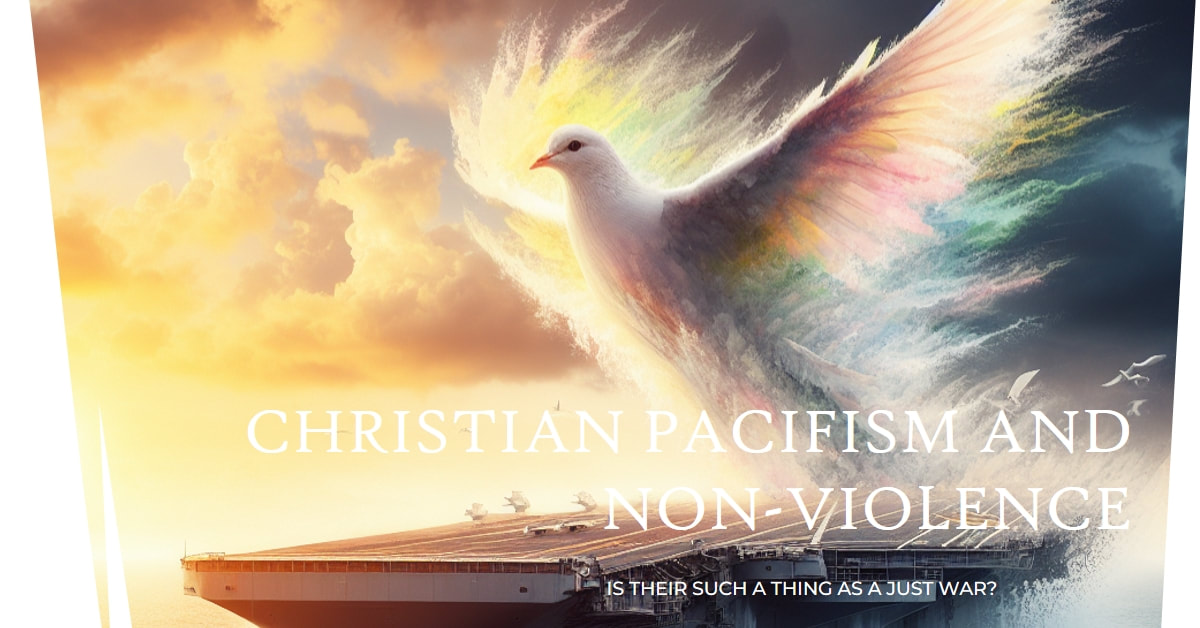The sermon series will delve into the concept of Christian Pacifism, examining its biblical foundation and questioning whether churches should ever endorse war.
The inaugural sermon of this series will explore the origins of the “Just war” theory, contemplating history and reasoning. The question at hand is whether it is compatible with Jesus’ teachings on “loving your enemies.”
David Champness
30/12/2023 12:27:22 pm
Augustine of Hippo, a prominent Christian theologian, first articulated his just war theory in the early 5th century. The primary work where he discussed the concept of a just war is his book “The City of God” (De Civitate Dei), written between 413 and 426 AD. In this work, Augustine explored various aspects of Christian theology and philosophy, addressing issues such as the nature of the state and the morality of war.
But was he right?
Joseph SamrajA
31/12/2023 11:06:57 am
A example of state of religion Christianity is Russian Orthodox Church under Putin
David
31/12/2023 01:04:24 pm
I agree.
A good example, especially with the modern context.
Joseph SamrajA
31/12/2023 11:13:10 am
Maybe Constantine or the Crusaders were able to justify killing the Muslim religion’s people because of not wanting to be forced to convert to Islam or be killed and perish all freedom gone
David
31/12/2023 01:00:01 pm
I agree that those thoughts where going through mind. But the questions still need to be asked.
1. Would Jesus have approve of their approach?
2. Additionally, they not only killed Muslims, but also Christians having raided Christian cities to fund their crusades (https://en.wikipedia.org/wiki/Sack_of_Constantinople).
2b. Does the act of killing 2000 Christians, along with looting and pillaging, align with Christian principles?
3. The crusades have fuelled ongoing conflicts and animosity among various groups, including reinforcement of a Islam’s holy war (evidenced in events like the Twin Towers attack 1000 years after the crusades).
3b. Question, is by attacking them, did we improved or worsened the situation?
3c. Do the ends justify the means?
3c. Could God have offered a better way to solution then handle the situation, then going to war?
These questions are just rhetorical and Hypothetical, to engage ones thinking…
Food for thought.
God bless
Joseph SamrajA
31/12/2023 10:43:40 pm
Hello Pastor David my question is as you pointed out in Mathew ch 24 The Lord talks about natural calamity and wars famine as inevitable going to happen if wars like Israel Gaza, thousands of innocent women children continue to die of diseases and malnutrition and wounds infected.. if the Ukraine Russian war people are dying and continue to suffer and die… why and what are we praying for if the Lord himself says these things are going to happen what are we praying to end war or to stop the suffering I know God is compassionate in his earthly life but I’m finding that God is silent
David
1/1/2024 12:55:07 pm
*** Warning – Warning ***
*** this is Q and A requires a Coffee and Chat****
*** Book a time with me for CC for full understanding of topic and Question.***
Your question is truly profound, delving into theological nuances that require more than a brief response. It touches on two significant aspects: God’s sovereignty and the role of prayer. While I’ll try to provide a concise address, it’s essential to note that these topics merit deeper exploration, and a comprehensive answer extends beyond the confines of a brief reply, stretching into the realms of two additional theological dimensions.
I appreciate your thoughtful question and the concern you’ve expressed regarding the ongoing wars and suffering in our world. It’s undoubtedly a challenging topic, and I want to offer some insights that align with my views as a “Free Will Baptist” perspective.
Mans Fault and responsibity.
Firstly, it’s crucial to remember our belief in human free will. In the Scriptures, we find that God has granted us the freedom to make choices, and unfortunately, the consequences of those choices can lead to wars, suffering, and natural calamities. While God is sovereign, we are accountable for our actions, and the world we live in is affected by the choices of individuals and nations, which includes the wars.
Concerning Prayer
Prayer is a powerful means of communication with God, and it serves various purposes. In times of suffering, prayer can provide comfort, strength, and a sense of connection with our compassionate God. Although certain events may be foretold in biblical prophecy, it’s essential to understand that prayer is not merely asking for change but also seeking solace and guidance from our Creator.
God is indeed compassionate, and His Word assures us of His comfort in times of trouble. Verses like Psalm 34:18 and Matthew 11:28-30 highlight God’s caring nature and willingness to provide solace to those who seek Him.
While acknowledging the challenges we face, I encourage you to pray not only for an end to wars and suffering but also for healing, peace, and positive change. Our prayers can be directed toward leaders, peacemakers, and those directly affected by conflicts and disasters.
Gods sovereignty.
Lastly, it’s important to recognize that there are aspects of God’s plan that we may not fully comprehend. His ultimate purpose includes redemption and restoration, even if the path to that goal seems unclear to us.
Simple answer that may be helpful
In times of uncertainty, let us find solace in prayer, trusting that God hears our cries, understands our concerns, and is at work in ways that surpass our understanding. May you find comfort and guidance as you navigate these challenging thoughts and continue to seek God’s wisdom. And though that prayerful relation, seek his will in how we are to help others and his kingdom during these times
Madonna Anne
7/1/2024 10:59:31 am
We talk about war in the sense of killing with guns but what about the war of killing with words and actions. We kill each others confidence, self esteem and self love. This is here and now not in a land far from us. When we start with our brothers beside us would it not eventually reach those far from us.
David
8/1/2024 03:45:50 am
For words and wisdom, remind me of the teaching in James 3:5-8. “So also the tongue is a small member, yet it boasts of great things. How great a forest is set ablaze by such a small fire! And the tongue is a fire, a world of unrighteousness. The tongue is set among our members, staining the whole body, setting on fire the entire course of life, and set on fire by hell. For every kind of beast and bird, of reptile and sea creature, can be tamed and has been tamed by mankind, but no human being can tame the tongue. It is a restless evil, full of deadly poison.”
I appreciate your recognition of the impact our words and actions can have on each other. In our daily lives, we indeed face a different kind of war — one that affects hearts and minds. As Christians, let us strive to emulate Christ’s love by building up rather than tearing down. By cultivating kindness, understanding, and support within our own communities, we can hope to extend that love to others, creating with hope and prayer, a ripple effect that reaches far beyond our immediate circles.



Leave A Comment